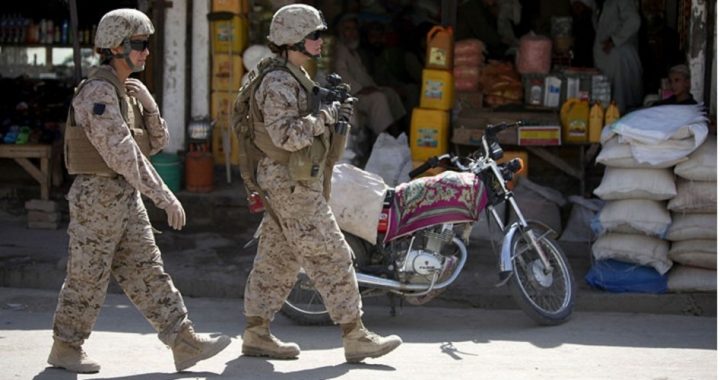
“That’s a hell of a price to pay for being stylish.” So said Clint Eastwood in the 1976 film The Enforcer, lamenting the dangers of lowering police standards in feminism’s name. But the reality is that society has been paying that price for a long time. And now the cost may go way up, with pressure growing on the Marines to lower standards for women. Writes the Washington Times:
Two years ago, Army Gen. Martin E. Dempsey, the nation’s top military officer, laid down an edict on the Obama administration’s plan to open direct land combat jobs to women: If women cannot meet a standard, senior commanders better have a good reason why it should not be lowered.
Today, the “Dempsey rule” appears to have its first test case.
The Marine Corps just finished research to see if female officers could successfully complete its rigorous Infantry Officer Course.
A [sic] IOC diploma is a must to earn the designation of infantry officer. Of 29 women who tried, none graduated; only four made it through the first day’s combat endurance test.
The question, though, is whether 0-29 outcomes will be accepted in our ism-über-alles atmosphere. As the Times also tells us, “‘The pressure is on the services from the White House’s politically correct crowd vis-a-vis Obama’s Pentagon appointees, who will force the services to accept degraded standards,’ said Robert Maginnis, a retired Army officer and author of the book ‘Deadly Consequences: How Cowards Are Pushing Women Into Combat.’”
Thinking standards would be lowered for a life-or-death job based on what’s “stylish” may seem ridiculous, but there’s well established precedent for it. To enable women to become cops, for instance, police standards were lowered in the 1970s based on “disparate impact” policy. This principle essentially states that if certain (invariably politically favored) groups don’t perform as well on a given test, that test is by definition discriminatory and must be scrapped.
And disparate-impact policy has only become more institutionalized. Consider that just last July, Obama’s Department of Justice sued the Pennsylvania State Police for requiring male and female applicants to pass the same exact physical fitness test (which already had been dumbed-down, it appears) to be admitted for cadet training. In other words, treating women equally is now an actionable offense. Now consider the recent announcement that the elite Navy SEALs will be opened up to women who, as the top-brass line goes, can meet “the gender non-specific standards.” Note that no headline-grabbing lawsuit is necessary to force a military branch to apply disparate impact — only enough behind-the-scenes pressure from the civilian command.
This fact, combined with the Obama administration’s goal of integrating women into all areas of combat, has critics wondering how gender non-specific the standards will actually be. It has just been reported, for instance, that the Special Operations Force (SOF) the Army Rangers just graduated its first two female recruits. Prior to the announcement, American Thinker’s Mike Phelps predicted that at least one would pass but also wrote, “I’m much less confident she will have passed completely on her own merits.… The president expects the Army to produce some female Rangers so he can crow about how he’s on the ‘right side of history.’ Massaging the process for political reasons is vintage Obama, but it undermines one of the reasons SOF units are so effective: no weak links.”
Whatever the case with the two female Rangers, there’s a larger point here. As Phelps also writes, “Neither the president nor anyone else has made a serious argument that women will make equally good infantrymen as men. Civilian advocates for the policy do argue, however, that women deserve the career boost that comes with serving in combat units.” This reflects the underlying problem: The military doesn’t exist as a social-experiment proving ground or to provide career opportunities. Its purpose, as talk radio giant Rush Limbaugh famously observed, “is to kill people and break things.”
Instead, we’re killing standards and breaking morale. As Phelps points out, the Army has already scrambled “to find ways to distribute combat loads creatively among squad members so females can be spared humping one hundred pound rucksacks.” And the Center for Military Readiness warns that Obama officials are “disregarding previously-undisclosed military combat experiments, which show injury rates among women twice as high as men’s.”
And these experiments aren’t outliers. Just consider sports. Girls suffer significantly more athletics-related injuries despite generally participating in less dangerous sports (e.g., football is almost exclusively played by boys). As examples, they suffer more concussions and rupture their anterior cruciate ligaments (the scariest of sports injuries) at a rate as high as five times that of boys.
These very real differences inspired Phelps to ask rhetorically, “Isn’t there a reason young men and women play on separate sports teams?” Note here that sex differences can be profound: The mile world record for 15-year-old boys is better than the women’s world record.
Of course, not all women suffer injuries. And some will say that not every military combat role requires physical capabilities beyond those of even the most exceptional women. Something true in principle is not always true in the particular. But particulars can’t always trump principles; for instance, we don’t give 13-year-olds driver’s licenses even though some of them may drive better than certain 19-year-olds. And what principles should prevail within the military?
Bear in mind that, as the Washington Times reports, placing “women into combat reduces effectiveness [and] harms unit cohesion.” And with the military being a characteristically masculine arena, it’s impossible to integrate women into it without feminizing the military or masculinizing the women — or both. Does it behoove a nation to follow such a course? Would a healthy civilization even consider it?
To reiterate, though, talk of equal standards will always be moot as long as the disparate-impact mentality prevails. And the consequences can be deadly. When Clint Eastwood said to a female recruit in The Enforcer, “Out there [on the street] you’ll have a partner. If you get blown away, he gets blown away with you,” it was just a movie. Yet life has imitated this art far too many times already. Consider the 1992 case of dangerous bank robber Jeffrey Erikson. After somehow getting his hands on a handcuffs key and escaping his bounds, he attacked 23-year-old part-time female marshal Terry Pinta, who was escorting him and other inmates from a federal building to a prison. After proceeding to choke Pinta, Erikson then, the Chicago Tribune explained, “pushed her into a wall, knocking her to the floor, Pinta said. She curled up in ‘almost a fetal position’ to try to prevent Erickson from wresting her gun away, she said, but he grabbed her arms, twisted her body, punched her in the mouth and yanked the gun from its holster.”
Of course, it might have been good to have someone present who could have done more than curl up in almost a fetal position.
Because while Pinta survived with minor injuries, her partner did get blown away — along with a court security officer.
Some officials were disciplined over the handcuffs key. Yet what of the other officials, the “stylish” ones, complicit in the two men’s deaths? Unfortunately, the price was paid by the two good law-enforcement officers, not the people who killed them with bad policy.
And that’s political correctness for you. Yeah, it’s a heck of a price to pay.



